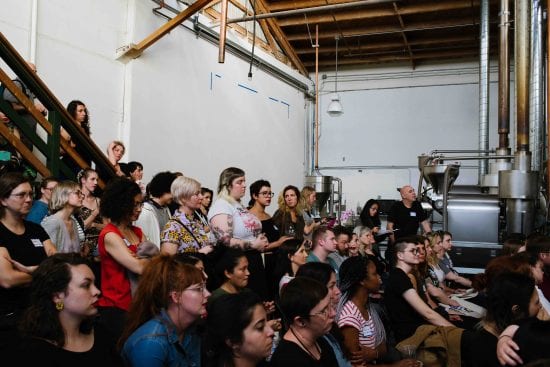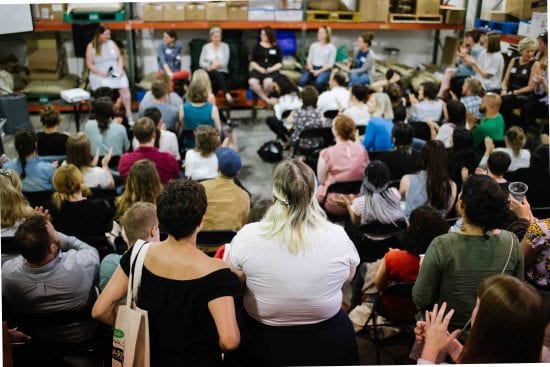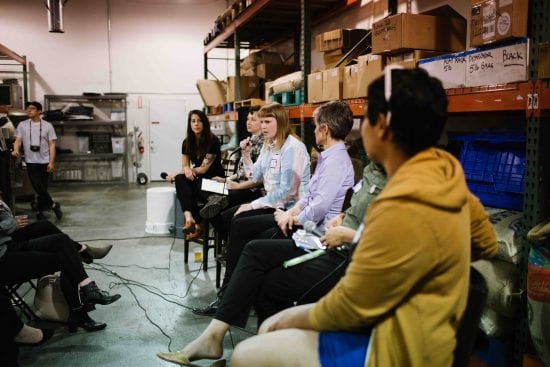
Barista Magazine contributor RJ Joseph talks about the importance of critical engagement in coffee and how we as an industry can be more inclusive and grow stronger.
BY RJ JOSEPH
SPECIAL TO BARISTA MAGAZINE
Photos by Lindsey Shea
A Rising Tide
Since the Global Specialty Coffee Expo in April, we’ve witnessed a dramatic upswell of critical public engagement of oppressive behaviors and structures relating to coffee and coffee people. A lot of this engagement is taking place on Twitter and Facebook, and some are also engaging this content in their own personal creative coffee spaces, like blogs, podcasts, and panels. People in coffee on every side of conflict are all here using our voices because we want to make the coffee industry a better place, even if we’re not always 100 percent calibrated on what that means.
Within this rise in discourse, many feel like their voices are being heard and taken seriously for the first time; they feel that their voices are strengthening the industry—an industry which, as is only natural, does have weaknesses. Others feel that the culture of public critical engagement is damaging and not a beneficial form of discourse, and that the negativity that they’re perceiving is hurting the industry.
I want to address all of that and show the non-believers out there why public critical engagement is so important to our industry’s present and future.

Some Backstory
The most major recent conflict in coffee is an excellent example of how public critical engagement improves the coffee industry. One of our industry leaders, a barista champion, publicly expressed the view that queer people are “far away from the faith.”
Many coffee people, some of whom are queer and/or Christian, were understandably upset, and he was publicly criticized on Twitter and asked to be accountable for the damage that his expressed views do to queer people. He apologized the next day.
But it wasn’t that simple for everyone. Many felt that it was wrong for him to be asked to be accountable, even though he himself did not feel that way. They characterized the interactions as bullying, attacking, and public shaming. I think at the core of this is that many people feel uncomfortable with public conflict, including public critical discourse, even when necessary and constructive.
A Great Example of Improvement Through Critique
The consequences of that interaction were major and positive. Queer people (especially in the American South) hear casually queer-phobic views expressed all the time by people in power. When this particular person in power was publicly criticized for anti-queer views and apologized, every queer coffee person who has ever had to silently accept anti-queer views as a part of the industry got to see a powerful example of public critical discourse changing the narrative in our industry.
It is a fact that diverse viewpoints and life experiences are necessary for a global and diverse industry with diverse clientele, and we as an industry all benefit when we get to hear a variety of voices and perspectives.
A global industry means the whole world, and everyone in it who brings capital; that includes all of us, not just the most powerful under the current paradigm. A major role model apologizing for anti-queer views very much benefits everyone in coffee because we will be able to gain and retain more queer workers, empower more queer producers, and net more queer customers, all of whom exist and bring capital to the equation. This is true regarding not just sexual orientation, but also race and gender.
When we allow more people from different backgrounds to participate and educate, we share more resources, and our problem-solving skills as a group go up.

You Can’t Make Something Better Without Admitting It’s Not Perfect
In order to dial in espresso, you have to admit that the shot you just pulled could taste better.
That might mean it tasted terrible, or it might mean you simply know it has more to give, more potential to live out. Either way, to achieve excellence you need to admit that a situation could improve.
The same is true in coffee as a global industry. We don’t have to pretend our industry is perfect in order to love and value it. In fact, in order to love and value it, we actually need to critique it to make sure it keeps improving. If no one had ever critiqued the way the commodity coffee industry homogenized and hindered coffee quality, specialty coffee wouldn’t exist. Without honest appraisal and public critique, our industry wouldn’t be here, so why are so many afraid of that same honest appraisal and public critical discourse when it’s turned on how systemic oppression operates in the global and local coffee industry?
Coffee as an industry has never been perfect and has never successfully addressed systemic oppression. Slavery and poverty have always been a part of coffee production. Black and brown people, women and children, have always been a part of how that cup of coffee got into our customer’s hand. Systems that exploit and oppress have not been eradicated in coffee at home or abroad. These systems need to be publicly criticized and discussed before they can even begin to be dismantled. I know that’s unpleasant, but it’s also a fact that anyone who works with green coffee is aware of.
You Can’t Use an Old Strategy on a New, Changing Situation
Maybe your espresso tasted fantastic with the recipe you used this morning, but now it doesn’t taste so great. Your shots have slowed down significantly, so what do you do? You adjust your recipe to meet the current situation, rather than ignoring the fact that your old strategy is no longer working. You adjust to the changing circumstances and continue to do your very best work.
The same is true in coffee as a global industry. Some of the things many have long enjoyed and benefited from are no longer working.
One of those things is non-diverse leadership. We got where we are for the most part under wealthy cisgender white male leadership, and that worked very well for a while for many (although obviously not everyone).
Looking toward the future, no one will be able to get their coffee or keep their coffee businesses running if we can’t address long-ignored compounding issues like climate change that affect coffee’s very existence.
To properly address the myriad issues experienced at the farm level, like labor shortages leading to diminishing supply, we need to elevate the voices of those with expertise and first-hand experience on the issues that lead to these problems in the first place. We need all the minds we have. To solve complex, multi-faceted problems we need complex, multi-faceted groups addressing them.

New Voices, New Leadership, and New Critique
New media and discussion forums created by women, queer people, and people of color like the Coffeewoman, Chocolate Barista, Boss Barista Podcast, and my own Queer Cup have led to a shifting balance in the public voices of coffee. The more that new perspectives are elevated, the more we start publicly discussing new issues in coffee. As women, POC, and queer people in coffee have started speaking up, systemic oppression and systemic solutions in the coffee industry have become everyday conversation for coffee folks who would not have known about them even a couple years ago.
This is a very good thing. We need all hands on deck to face the challenges coffee is going to hand us in the coming years. Coffee people are not creating these issues out of thin air. We are addressing issues that have been ignored for a long time and do need to be addressed in several different ways—in public and in private, in discourse and in action, and in policy.
The Future
As we continue to uplift new people in coffee and let new perspectives access industry knowledge and platforms, the industry will become more and more equipped to handle issues abroad like how to motivate children of farmers to stay on the farm, how to enlist steady migrant labor, and how to take the knowledge that women working on farms have and empower them to disseminate it, as well as issues at home like how to cut costs by increasing retention and how to motivate your labor force when money is scarce.
We will grow and become stronger, and we will face challenges here and abroad with a diverse and truly excellent global team.
If you find yourself resisting new voices and ideas, I want you to think about that old espresso recipe that is no longer working, and how foolish you’d feel if you were unwilling to change the grind simply because it used to work.
We Need Public Critical Engagement
When you meet a conversation that feels uncomfortable, know that it feels uncomfortable because it’s a challenge, not because it’s going to damage you. Everyone makes mistakes at times, and everyone occasionally resists change.
Just know that coffee is a family and we’re here for you. Just like in a healthy family, we all need to challenge each other and address problems frankly, and we need to solve them together. As uncomfortable as public critical engagement might be at times, it is crucial to the present and future of our industry.
 ABOUT THE AUTHOR
ABOUT THE AUTHOR
RJ Joseph roasts coffee and writes a blog called Queer Cup in addition to her other adventures in coffee journalism. Her writing focuses primarily on equity, workers’ rights, and alternatives to the status quo. In her free time she loves cooking, reading, and being in Oakland. You can follow her on Instagram and Twitter @rj_sproseph.

